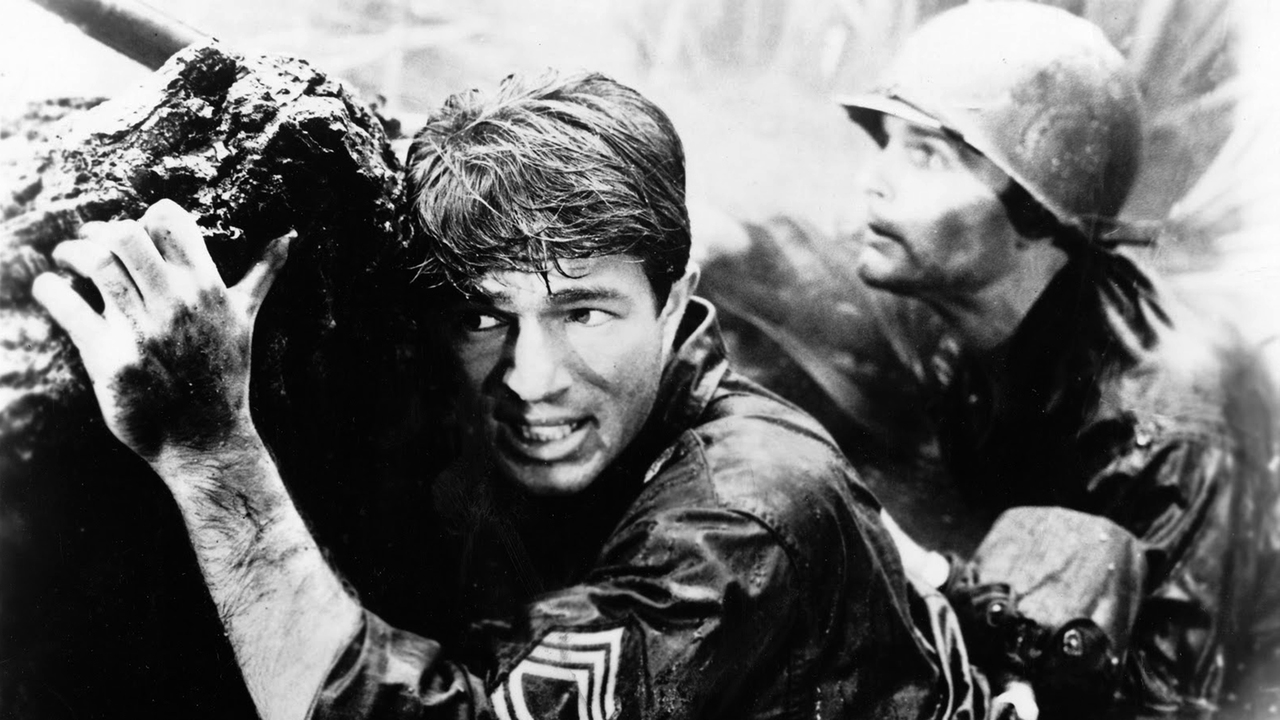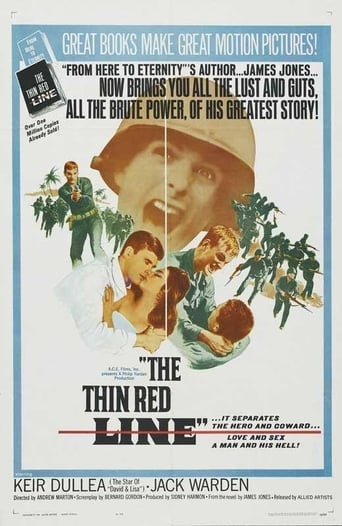

everything you have heard about this movie is true.
... View MoreInstead, you get a movie that's enjoyable enough, but leaves you feeling like it could have been much, much more.
... View MoreIt was OK. I don't see why everyone loves it so much. It wasn't very smart or deep or well-directed.
... View MoreThis is one of the best movies I’ve seen in a very long time. You have to go and see this on the big screen.
... View MoreBritish actor Terence Hardiman, who played an abbot in the excellent series "Cadfael" and a Luftwaffe major in another excellent British TV series "Secret Army" had a tiny bit role in the movie. He appears as a survivor in the aftermath of a vicious firefight with Japanese troops, grouped around the colonel who hastily arrived at the sight to inspect the conditions of his men. I suppose he was just a nobody at that time.This is a highly recommended black and white film for war movie buffs. Very rarely aired on TV.
... View More"A new motto: If you can't trans-cend, you might as well des-cend. I'm scoping out the bottom here....Mass, Density. Permanence. Finality. Termination. Rock. Even the word conveys heft, a certain assurance. No loss of focus here." – "Meditations in Green" (Stephen Wright)Film lags behind most other fields, mediums and art-forms, and so its no surprise that even over half a century after its release, few war films have been able to match the power of James Jones' novel, "The Thin Red Line".The second book in his WW2 trilogy, Jones' novel told the story of Charlie company and their participation in the battle of Guadalcanal. But what stood out about "Line" was the way it read more like a Vietnam precursor than a novel about WW2. Having himself fought at Guadlacanal, Jones had no time for the usual "greatest generation" and "noble war" fabrications. His novel was filled with drunks, cowards, thieves, sodomites, slackers, homosexuals and only occasionally heroes. His grunts battled mind-numbing tedium, fatigue, disease, nature, each other and their officers as much as they did the Japanese, and when victories were won, they were fairly meaningless. "It's just a fight over property," one character sighs.But for Jones, war was more than an overpowering injustice. His characters were separated into those who found themselves trapped in an indeterministic universe, wholly overwhelmed by circumstance, and those who turned war into a private struggle, a means of finding existential authenticity. This polarity is typical of war novels of the era, the theme of individuals as mere cogs in the war machine introduced by master authors like Dos Passos ("Through the Wheat" and "Three Soldiers") and Thomas Boyd and carried on in the works of artists like Norman Mailer, Joseph Heller, Stephen Wright, William March, and James Jones. Heavily influenced by post war existentialism, all these novelists offered only the faintest suggestion of hope for the individual.So beyond war, these artists used combat as an avenue to examine the plight of the individual caught up in and beleaguered by our twentieth century industry culture, the battlefield experience standing in for political and social cognition in our time. Norman Mailer's "The Naked and the Dead", for example, envisions a ruthlessly naturalistic world in which the so-called "rugged individual" is non-existent. Those who aspire to that state, such as Mailer's Sergeant Croft, are inevitably thwarted by circumstance. Likewise the heroes of William March's "Company K", Mailer's "The Naked And The Dead" and Heller's "Catch 22", all centring on characters trying to take a stand for personal, existential freedom against impossible odds. For these authors, free choice is not possible; we choose based upon economic necessities, upon psychic drives, or upon the indoctrination of our social upbringing.The intersection of this impotence with the impersonal, parasitic nature of warfare (war as a grotesque extension of the corporate/economic/political world), turns up again in Jones' own "The Thin Red Line", where the author has his characters Bell and Welsh see the individual as irrelevant and of little interest or worth to anyone but himself, whilst his characters Doll and Fife are shown to be nothing but a reflection of the opinions of others.But Jones always went further than trendy existentialism and one-note defeatism. What his novels did was set up oppositions, or opposing ideologies, and set them at war. Observe how he has one pair of characters embody different philosophical positions: for one soldier, if a human's actions are beyond his or her control, then the cause of war is irrelevant and inescapable. For the other, if war is a product of human choice, then three general groupings of causation - biological, cultural, and reason – can be identified and confronted.This method of philosophical investigation continues throughout the novel. Another pair of characters, for example, battle over whether or not war is ever morally justifiable. One symbolises war (or non-confrontation) from an ethical perspective – akin to St Aquinas' writings on "Just War" - while the other views war as an all-pervasive phenomenon of the universe. Such a description corresponds to a Heraclitean ("War is the father of all things") or Hegelian philosophy in which change (physical, social, political, economical, etc) can only arise out of conflict.Sandwiched between the WW2 masters and the next wave of great war novelists (Michael Herr, Neil Sheehan, Robert Mason, Philip Caputo, Gustav Hasford, Michael Maclear), director Andrew Marton's film adaptation of Jones' "Line" is an odd beast. It doesn't have the thematic weight or dramatic power of Jones' novel, but in the context of the other (mostly dumb) war movies released in the late 50s and early 60s, it's a remarkable film, an odd clash between grungy New Wave aesthetics, raw (not quite method) acting, and the stiff conventions of Old Hollywood. Unfortunately the film received little promotion and quickly faded into obscurity and is today mostly known for featuring an early performance by actor Keir Dullea.Decades later, "Line" would once again be adapted, this time by director Terrence Malick. Upon its release, many derided Malick's film for revoking or reversing the philosophy of Jones' novel, writers painting Malick as some kind of hippie spiritualist who turned war into a "natural", "poetic thing", a stark contrast to the cold, industrial and absurdist universe of Jones. Such a misreading is common, but not true.7.9/10 – Few war movies pass my BS-meter, but this one creaks through. These platoon movies tend to have a smallness – a myopia typical of a grunt's-eye-view - which is very unsatisfying, but Jones' writing is so strong, his lingo so beautiful, that Marton's flick is elevated by dint of sheer association. Even an auteur like Malick is massively indebted to Jones, some of the best moments and characters in his adaptation (Malick's cynical Sean Penn character even pops up in many of Jones' short stories – a surrogate for the writer) owing a lot to Jones' pen.
... View MoreThis happens to be one of those cases where the original film is not the superior product. While this version of the film sought to follow the story much closer, it proves to be too short and plot driven. Maybe it was because I watched the 1998 version first, or maybe this was too hastily made in order to provide a visual adaptation of the book (James Jones wrote the book in 1962). While people will always put down the 1998 version, this version isn't a definitive piece of work either. A good story, but so inferior to the 1998 version.
... View MoreA solid effort hampered by the the filmmaking conventions of that time. Some of the acting is amateurish, and the dialogue stilted. But it does confront the serious moral issues of war, unlike most war movies of that era. The theme is essentially the same as the current version -- that is, how does man endure in war? It presents several models for survival. Many of the scenes are exactly the same as in the 1998 version, though it includes others that are not found in Malick. This attempt focuses more on the relationship between Welsh (Jack Warden) and Doll (Keir Dullea). The music is awful, like something out of a cheesy 50s horror flick. Also, it's amazing how much Guadalcanal resembles the high desert of Southern California. But this is well worth a rent if one has the proper expectations...
... View More